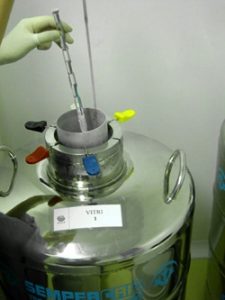Why should one think of freezing one's eggs?

This text has been written for women between 30 and 40 years of age who are not yet thinking of having children— for whatever reason: they may be investing in their careers, they are single, or they're not sure that they will want to be mothers one-day. In any case...children are a remote option for them at the moment.
First of all I will show you some statistical data that most people do not know, but which are of the utmost importance:
The chance of becoming pregnant is directly linked to a woman's age—most people know this, and there are thousands of scientific articles showing that the quality and number of eggs decrease with age, particularly after 35.
However, look at the following table:
CHANCE DE ENGRAVIDAR POR CICLO MENSTRUAL
|
AGE |
20 |
25 |
30-34 |
35-37 |
38-40 |
41-42 |
>42 |
|
Naturally |
35% |
25% |
20% |
15% |
5% |
2% |
0,5% |
|
IAI |
40% |
30% |
20-25% |
18-20% |
8-10% |
5% |
1-2% |
|
IVF |
50% |
50% |
45-50% |
40-45% |
30-35% |
15% |
5% |
Over 44-years-old – less than 1% in IVF
It is clear that these numbers are an average and not all work in the same way, however, nowadays it is very common to postpone motherhood and the woman will often start trying for her first child after 37 years. Thus, it is very important to know that there is a possibility for the EGG FREEZING.
Family planning should be part of women's lives and even if they manage to have their first child at 37-38 years of age, we will have a hard time getting a second child at 39-40 years of age.
When, in the first appointment, I show patients the statistics for the rate of pregnancy, even in in vitro fertilization, some patients become indignant. The rate of pregnancy is quite reasonable, but the chances of actually giving birth at 40 years of age are approximately 12%, given that the likelihood of a miscarriage also rises dramatically with age.
Many will say, “but I'm really healthy, my menstruation is normal, I don't smoke, I don't drink, etc..." Of course certain factors worsen their chances (such as smoking), but an ovary is 40 years old in a 40-year-old woman.
Another frequently asked question in this age range is: “will I never be able to get pregnant with my own eggs?" "Possibly not.”
The media confuses people by publishing stories about 44 to 45-year-old, or even older, women who are pregnant, sometimes even carrying twins!! Just this week I treated a 40-year-old patient who thinks she is a young woman (reproductively speaking), because her friend got pregnant with twins at 48.
Most of these patients over 43 became pregnant through the technique of donated eggs, in other words, using the egg of a younger woman that has been fertilized with their husband's or partner's sperm. This is a widely used and completely ethical technique employed by assisted reproduction clinics; however, many women are not aware of this.
Egg freezing today allows us to preserve fertility.
But how many eggs do I need to keep stored?
See the table below, the funnel is large in relation to the number of frozen eggs x baby at home, but it is clear to realize that the sooner they freeze, the fewer eggs will be needed for a good pregnancy rate.
ALGORITHM FOR CALCULATING THE NUMBER OF OOCYTES
REQUIRED TO PRODUCE 1 EUPLOID BLASTOCYST (Chromosomally normal)
| AGE | < 35 | 36/37 | 38/39 | 40/41 | >42 |
| COLLECTED | 6 | 8 | 12 | 15 | 20 |
| MATURES | 5 | 6 | 10 | 12 | 16 |
| FERTILIZED | 4 | 5 | 7 | 10 | 12 |
| BLASTOS | 2 | 2 | 3 | 5 | 6 |
| EUPLOIDS | 1 | 1 | 1 | 1 | 1 |
In practice, I observe that egg freezing functions as "biological insurance". Patients are very relieved to have their eggs stored, even if they never use them. The pressure of age on motherhood falls, the race against time decreases.
They may even become pregnant naturally afterwards, but the psychological effects after freezing are evident. And obviously the chance of getting pregnant with younger eggs is always greater!
